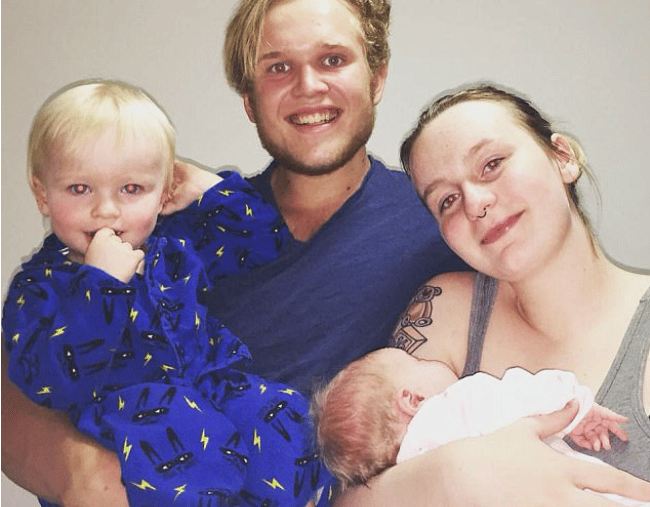
Mollie Smith was 13 years and 11 months old when she fell pregnant with her son, Theodore.
She hadn’t intended to fall pregnant at all, and she knew, upon reading that pregnancy test for the very first time, that perhaps her boyfriend wouldn’t be stoked with the news.
“I had gastro, but I had a funny feeling it was something more. I took the [pregnancy test] and it came back with [a positive result]… and Oscar was not impressed I don’t think,” Mollie told The Project on Wednesday night.
Oscar Wilks, then also 13, worried about what his parents would say.
“I just sort of wondered what my parents would think, you know. There are a lot of things running through your head at that point.”
The two were taking contraception but, like so many do, thought pregnancy would “never” happen to them.

"I was on the pill, then I stopped and moved to another one which was horrible. In between that period, we were just a bit stupid, weren't we? Yeah, I fell pregnant. I think we thought it will never happen to us," Mollie told the show.

Top Comments
A few years ago at my workplace, the payroll mistress (who was in her 30's at the time) walked up to me in the middle of an open plan office and told me in quite a loud voice that I was a very naughty girl. I was wearing a swing top and she (wrongly) thought I was pregnant. I was also 28 and, whilst its irrelevant to the situation, she obviously didn't know I was married. I have often thought about that moment and regretted that I wasn't quick thinking enough (or so taken aback) to put her in her place firstly, but also thought about the fact that if I was in a bad place emotionally because I was single, young and pregnant, how much worse would judgement from this woman have made me feel.
To be pregnant at 13 is obviously not everyone's ideal situation, but good on you both for accepting what has happened and getting on with your lives together.
Headline writer: Oscar didn't "fall pregnant". Mollie did. Oscar also didn't give birth, or gestate a foetus. Give credit where the credit is due; we don't need to include men into an act wherein it is actually physically impossible for them to participate.
They dealt with it as a couple and remain committed to one another as a family. I think more women would be more happy if the fathers of their children felt the same way, rather than washing their hands of it and bailing out on them - which, let's face it, is probably far more common.
Being committed to one's child and the family is called being a father, not being "pregnant". I guess I'm not the only one who thought this will be a transgender story, in fact that's why I opened the article in the first place.